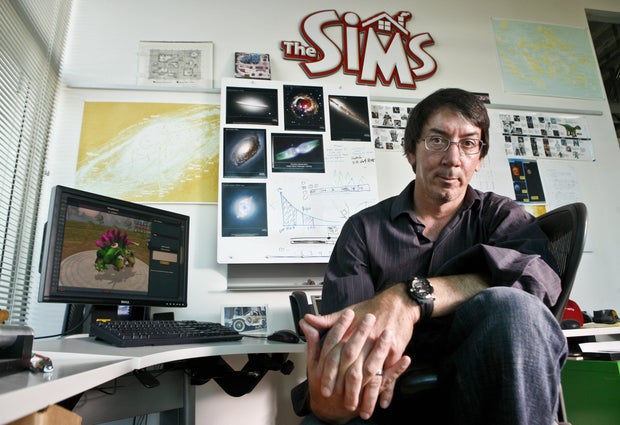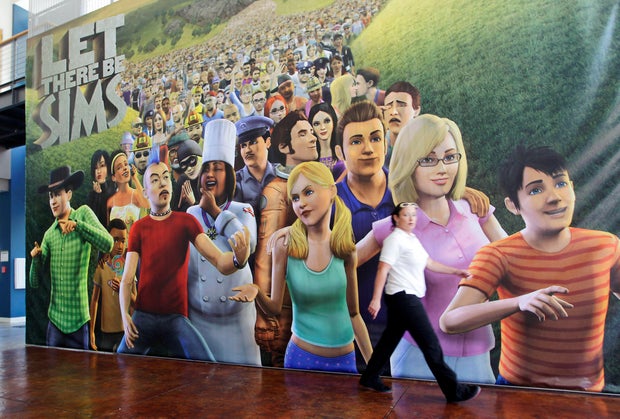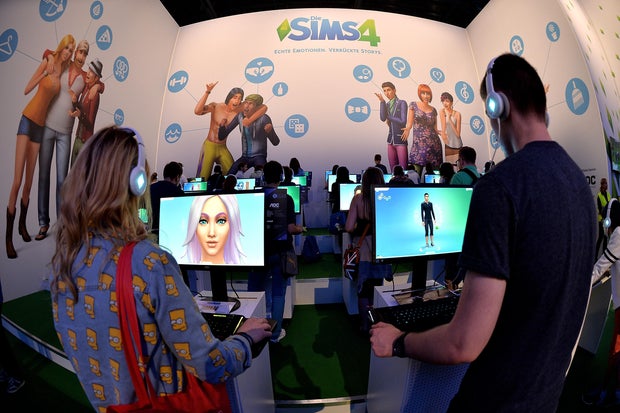As the year 2000 ushered in the new millennium, boy bands and pop stars dominated the music charts, and the International Space Station welcomed its first crew, while back on Earth, reality TV was forever changed by an inaugural group of castaways on the CBS show “Survivor” — all when more than 70% of Americans didn’t own a cellphone and only half of U.S. households had a computer.
Phil Salvador, library director for the Video Game History Foundation, reflected on this era of rapid technological growth.
“If you were playing especially computer games back then, you were probably playing on the family computer,” Salvador said.
It was a time when gaming hardware was evolving, and titles like Halo and first-person shooters were on the rise. But one game development company, Maxis, was trying something different: simulation games, designed to replicate real-life activities.
At the helm was legendary game designer Will Wright, who had a personal reason for exploring the genre.
“Will Wright actually lost his home in the Oakland Hills Fire in 1991, and he had to start rebuilding his life, and that became the inspiration for his idea of Dollhouse,” Salvador said.
Ryan Anson/AFP via Getty Images
Initially a virtual construction game, Dollhouse failed to draw much interest. But when Maxis was acquired by Electronic Arts in 1997, EA recognized the quirky potential of the game.
Salvador noted that EA realized that people liked telling stories and interacting with the simulated people more than the game’s original objective: to construct homes. It was around this time when EA changed the concept from Dollhouse to The Sims.
The Sims spent nearly a decade in development, ultimately creating a digital space where players could control virtual beings, environments and life choices. When the game debuted in February 2000, it was unlike anything seen before.
“It is a game where you’re helping people do chores around the house and use the toilet and things like that, and it’s not the most immediately compelling game idea, but once people started seeing it hands-on, I think they realized there was something special happening there,” Salvador said.
Tony Avelar/Bloomberg via Getty Images
Despite the competition from PlayStation 2 and Xbox, The Sims quickly became a cultural phenomenon. By 2002, it had become the best-selling PC game in history.
“It is … humbling to look back on all of the people that we’ve impacted,” said Laura Miele, president of EA Entertainment, Technology and Central Development. “Multiple generations of people grew up with The Sims.”
The franchise has redefined what it means to be a gamer, with women making up around 60% of the most recent game’s player base. With over 500 million players, The Sims remains the largest brand in life-simulation games.
Miele credits the game’s successful longevity to it being an open canvas for creators to express themselves no matter their age.
“A player, whether you’re 12 or 82, you can always be connected at the culture that you love through The Sims,” Miele said.
The Sims continues to resonate with culture-makers too. This year, Grammy award winner Doja Cat joined The Sims’ celebratory 25-hour livestream, as did Chappell Roan, the newly crowned best new artist who expressed interest in being Simmified, aiming to join the likes of the Black Eyed Peas and Glass Animals’ Dave Bayley, who have recorded their songs in Simlish, the fictional language created for the game.
“Simlish was a brilliant, brilliant concept for The Sims, I have to say,” said Rachel Franklin, EA’s senior vice president and group general manager of lifestyle entertainment. “What it does is it allows the player to be able to say, ‘Hmm, I think they’re saying this,’ and allowing for choice and creativity and meaning that’s directly connected to the player.”
Under Franklin’s direction, The Sims 4 has become the most widely played title in the franchise, offering players unparalleled control over the customization of their Sims and their environments.
“We get stories all the time about how people, for example, they want to be an architect, and so they go and they play with building in The Sims, and that translates into, ‘Hey, I was able to get my dream job as an architect because of all of that time I spent playing,'” Franklin said.
Sascha Steinbach/Getty Images
“There’s also a lot of people that experiment with their own lives in The Sims, where some people will build a family, find what makes them happy through this cause and effect with these little people,” she said. “It’s a safe space, and it’s an optimistic universe. It’s a place where, in the end, it all works out.”
As The Sims celebrates its 25th anniversary, its legacy is undeniable.
“In terms of importance, it is very close to the top of the list,” said Salvador. “When you think about games that really broke ground for what video games could be, you see, you know, Doom, which is the game, one of the first games that was a first-person shooter that really clicked on. You see something like Super Mario Bros. and Donkey Kong, obviously. The Sims deserves to be in that same conversation.”
And as to why the game is still relevant, Salvador said, “Everybody brings a little of themselves into the game. Everyone gets something a little bit different out of it, far more than what the developers ever intended. How many games can say that?”





